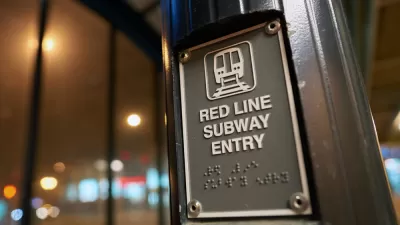A controversial form of value capture, tax increment financing begs for further analysis and understanding. A new report by the Lincoln Institute of Land Policy sheds light on the subject.

Tanvi Misra shares news of a new study by David Merriman, professor at the University of Illinois at Chicago, for the Lincoln Institute of Land Policy that digs into the causes and effects of Tax Increment Financing.
The report, titled "Improving Tax Increment Financing (TIF) for Economic Development," examines available research on the implementation and impacts of TIF before coming to the conclusion "that the mechanism, while helpful in some ways, leaves a lot to be desired," according to Misra.
Misra explains how TIF works, and illuminates some of the common criticisms about TIF in the real world. For instance:
Critics often charge that it funnels money out of the taxpayers’ pockets into a special fund that, by and large, works in a pretty opaque manner. While some of that money funds essential public works, much has also gone towards erecting new Whole Foods, renovating glitzy hotels, and building stadiums—the type of projects, one might argue, should not require such incentives. And the evidence Merriman analyzes suggest [sic] they may have a point. He shows that, in most cases around the country, the tool did not fulfill its main goal of boosting economic development.
The article also includes resources for understanding the controversy surrounding TIF in Chicago, where TIF stays in the news almost constantly.
FULL STORY: The Trouble With TIF

Maui's Vacation Rental Debate Turns Ugly
Verbal attacks, misinformation campaigns and fistfights plague a high-stakes debate to convert thousands of vacation rentals into long-term housing.

Planetizen Federal Action Tracker
A weekly monitor of how Trump’s orders and actions are impacting planners and planning in America.

San Francisco Suspends Traffic Calming Amidst Record Deaths
Citing “a challenging fiscal landscape,” the city will cease the program on the heels of 42 traffic deaths, including 24 pedestrians.

Defunct Pittsburgh Power Plant to Become Residential Tower
A decommissioned steam heat plant will be redeveloped into almost 100 affordable housing units.

Trump Prompts Restructuring of Transportation Research Board in “Unprecedented Overreach”
The TRB has eliminated more than half of its committees including those focused on climate, equity, and cities.

Amtrak Rolls Out New Orleans to Alabama “Mardi Gras” Train
The new service will operate morning and evening departures between Mobile and New Orleans.
Urban Design for Planners 1: Software Tools
This six-course series explores essential urban design concepts using open source software and equips planners with the tools they need to participate fully in the urban design process.
Planning for Universal Design
Learn the tools for implementing Universal Design in planning regulations.
Heyer Gruel & Associates PA
JM Goldson LLC
Custer County Colorado
City of Camden Redevelopment Agency
City of Astoria
Transportation Research & Education Center (TREC) at Portland State University
Jefferson Parish Government
Camden Redevelopment Agency
City of Claremont




























